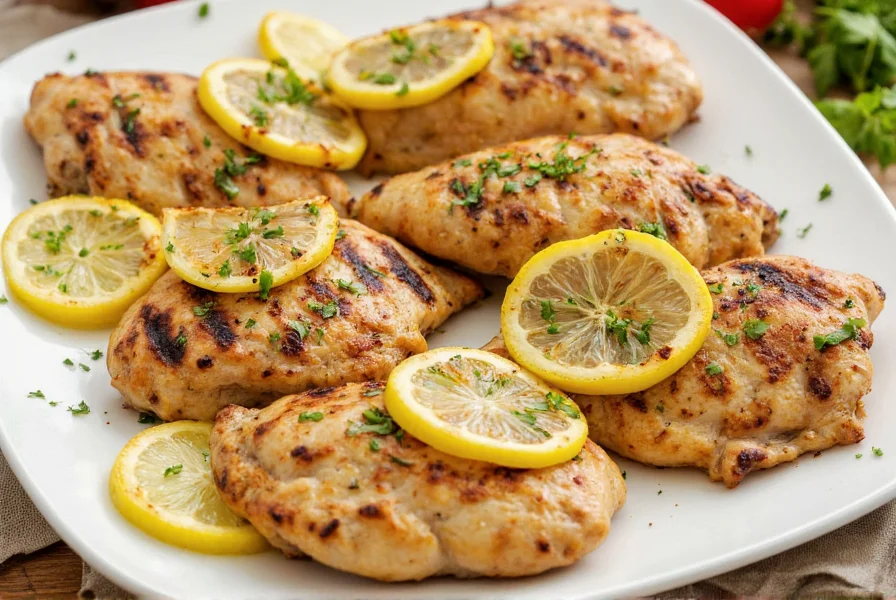Lemon pepper seasoning has become a pantry staple for home cooks seeking quick flavor enhancement without complicated techniques. This simple blend of dried lemon zest, black pepper, and often salt creates a versatile seasoning that works across proteins, vegetables, and starches. Understanding how to maximize its potential separates adequate dishes from truly exceptional ones.
Understanding Lemon Pepper Flavor Dynamics
Lemon pepper's magic lies in the balance between citrus brightness and peppery warmth. Unlike single-ingredient seasonings, this blend provides multiple flavor dimensions that interact differently with various food components:
| Food Category | Best Application Method | Timing Recommendation |
|---|---|---|
| Poultry | Rub under skin and on surface | 30 minutes before cooking |
| Fish & Seafood | Light surface application | Immediately before cooking |
| Vegetables | Toss with oil first, then season | Before roasting or grilling |
| Starches | Mix into finished dishes | After cooking completes |
Top Lemon Pepper Seasoning Recipes
Lemon Pepper Grilled Chicken Breasts
One of the easiest lemon pepper chicken recipes starts with boneless, skinless chicken breasts. Create a simple marinade of olive oil, minced garlic, and 2 tablespoons of lemon pepper seasoning. Let the chicken rest in this mixture for 30 minutes before grilling over medium heat. The acid in the lemon component helps tenderize the meat while the pepper provides depth. For restaurant-quality results, finish with a squeeze of fresh lemon juice after cooking to revive the citrus notes that diminish with heat exposure.

Garlic Lemon Pepper Salmon
Healthy lemon pepper salmon dishes benefit from the seasoning's ability to complement fish without overpowering delicate flavors. Pat salmon fillets dry, then sprinkle generously with lemon pepper seasoning. Heat olive oil in an oven-safe skillet, sear the salmon skin-side down for 4 minutes, flip, and transfer to a 400°F oven for 8-10 minutes. The high heat of oven finishing ensures the lemon pepper forms a flavorful crust while keeping the interior moist. This method produces restaurant-quality results with minimal effort.
Lemon Pepper Roasted Vegetables
For perfect lemon pepper seasoning for grilled vegetables, start by tossing your vegetable selection (asparagus, bell peppers, zucchini) with 1-2 tablespoons of olive oil per pound. This oil layer helps the seasoning adhere and prevents burning. Sprinkle with lemon pepper seasoning just before placing on the grill or roasting pan. Root vegetables like potatoes benefit from a longer marinating time (15-20 minutes), while delicate vegetables like asparagus should be seasoned immediately before cooking to prevent the lemon component from drawing out moisture.
Advanced Lemon Pepper Techniques
Professional chefs use several techniques to maximize lemon pepper's potential that home cooks can easily adopt. Creating a lemon pepper compound butter allows for controlled flavor infusion during cooking. Simply mix softened butter with lemon pepper seasoning (2 tablespoons per stick of butter), roll into a log, and chill. Slice coins to melt over finished proteins or vegetables.
When preparing vegetarian recipes with lemon pepper seasoning, consider adding nutritional yeast to boost umami notes that complement the citrus. For pasta dishes, reserve some pasta water before draining—this starchy liquid helps the lemon pepper adhere to noodles when tossed with a bit of olive oil.
Avoiding Common Lemon Pepper Mistakes
Many home cooks make these critical errors when using lemon pepper seasoning:
- Applying too early in the cooking process, causing citrus elements to burn
- Using excessive amounts, overwhelming other flavors
- Not accounting for salt content in commercial blends
- Storing in clear containers where light degrades flavor compounds
For best results, store lemon pepper seasoning in an airtight container away from heat and light. Properly stored, it maintains peak flavor for 6-8 months. When making homemade lemon pepper seasoning recipes, use fresh lemon zest rather than dried for superior flavor intensity.
Frequently Asked Questions
Can I use lemon pepper seasoning in place of regular pepper?
While lemon pepper contains black pepper, it shouldn't directly replace regular pepper due to its citrus component. Use it as a finishing seasoning rather than during initial cooking stages. For recipes calling for black pepper, add lemon pepper at the end for brightness while using regular pepper for foundational heat.
What's the difference between lemon pepper seasoning and lemon pepper marinade?
Lemon pepper seasoning is a dry blend of lemon zest, pepper, and salt, while marinades contain liquid components like oil, vinegar, or citrus juice. The dry seasoning works best for direct application before cooking, while marinades require soaking time. For quick preparations, the dry seasoning provides more immediate flavor impact.
Which dishes shouldn't use lemon pepper seasoning?
Avoid using lemon pepper seasoning with strongly flavored cheeses, chocolate-based dishes, or recipes featuring vinegar as the primary acid. The citrus notes can clash with these ingredients. It also doesn't complement dishes already featuring dominant citrus flavors, as this creates unbalanced acidity.
How can I make my own lemon pepper seasoning?
Combine 2 tablespoons dried lemon zest, 1 tablespoon freshly ground black pepper, 1 teaspoon garlic powder, and 1 teaspoon onion powder. For salt-free version, omit salt; otherwise add 1½ teaspoons fine sea salt. Mix thoroughly and store in an airtight container. Freshly made seasoning provides more vibrant flavor than commercial blends.










 浙公网安备
33010002000092号
浙公网安备
33010002000092号 浙B2-20120091-4
浙B2-20120091-4